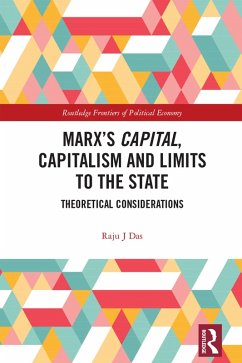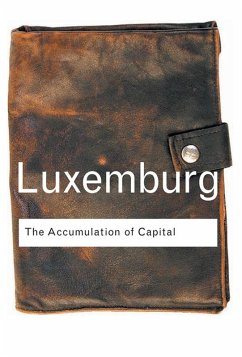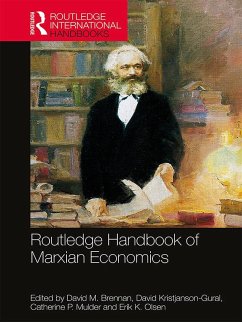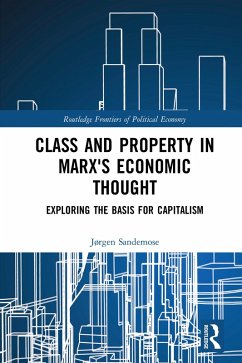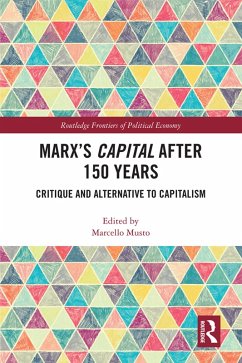
Marx's Capital, Capitalism and Limits to the State (eBook, ePUB)
Theoretical Considerations
Versandkostenfrei!
Sofort per Download lieferbar
41,95 €
inkl. MwSt.
Weitere Ausgaben:

PAYBACK Punkte
21 °P sammeln!
Marx's Capital, Capitalism and Limits to the State examines the capitalist state in the abstract, and as it exists in advanced capitalism and peripheral capitalism, illustrating the ideas with evidence from the North and the South.The volume unpacks the capitalist state's functions in relation to commodity relations, private property, and the crisis-ridden production of (surplus) value as a part of the capital circuit (M-C-M'). It also examines state's political and geographical forms. It argues that no matter how autonomous it is, the state cannot meet the pressing needs of the masses signifi...
Marx's Capital, Capitalism and Limits to the State examines the capitalist state in the abstract, and as it exists in advanced capitalism and peripheral capitalism, illustrating the ideas with evidence from the North and the South.
The volume unpacks the capitalist state's functions in relation to commodity relations, private property, and the crisis-ridden production of (surplus) value as a part of the capital circuit (M-C-M'). It also examines state's political and geographical forms. It argues that no matter how autonomous it is, the state cannot meet the pressing needs of the masses significantly and sustainably. This is not because of so-called capitalist constraints, but because the state is inherently capitalist. Each chapter begins with Capital volume 1. And each chapter ends with theoretical/practical implications of the ideas which taken together counter existing state theory's focus on state autonomy and reforms and point to the necessity for the masses to establish a new transitional democratic state. But the book goes 'beyond' Marx too, as it deploys the combined Marxism of 19th and 20th centuries.
Marx's Capital, Capitalism and Limits to the State will interest scholars researching state-society/economy relations. It is suitable for university students as well as established scholars in sociology, political science, heterodox economics, human geography, and international development.
The volume unpacks the capitalist state's functions in relation to commodity relations, private property, and the crisis-ridden production of (surplus) value as a part of the capital circuit (M-C-M'). It also examines state's political and geographical forms. It argues that no matter how autonomous it is, the state cannot meet the pressing needs of the masses significantly and sustainably. This is not because of so-called capitalist constraints, but because the state is inherently capitalist. Each chapter begins with Capital volume 1. And each chapter ends with theoretical/practical implications of the ideas which taken together counter existing state theory's focus on state autonomy and reforms and point to the necessity for the masses to establish a new transitional democratic state. But the book goes 'beyond' Marx too, as it deploys the combined Marxism of 19th and 20th centuries.
Marx's Capital, Capitalism and Limits to the State will interest scholars researching state-society/economy relations. It is suitable for university students as well as established scholars in sociology, political science, heterodox economics, human geography, and international development.
Dieser Download kann aus rechtlichen Gründen nur mit Rechnungsadresse in A, B, BG, CY, CZ, D, DK, EW, E, FIN, F, GR, HR, H, IRL, I, LT, L, LR, M, NL, PL, P, R, S, SLO, SK ausgeliefert werden.




